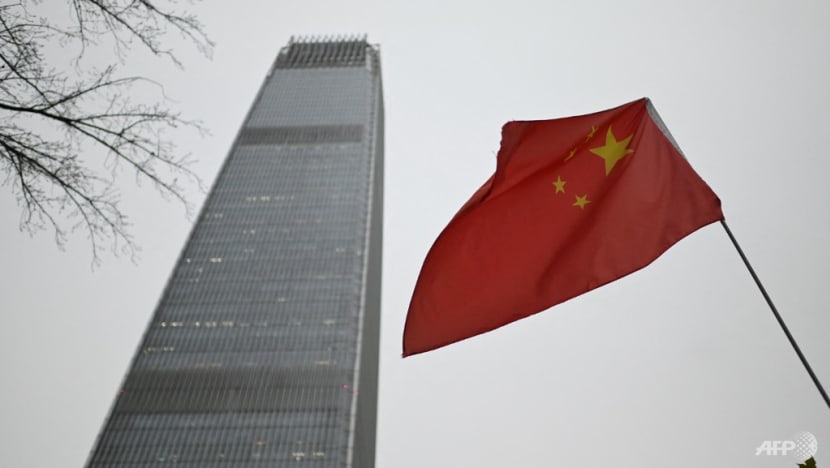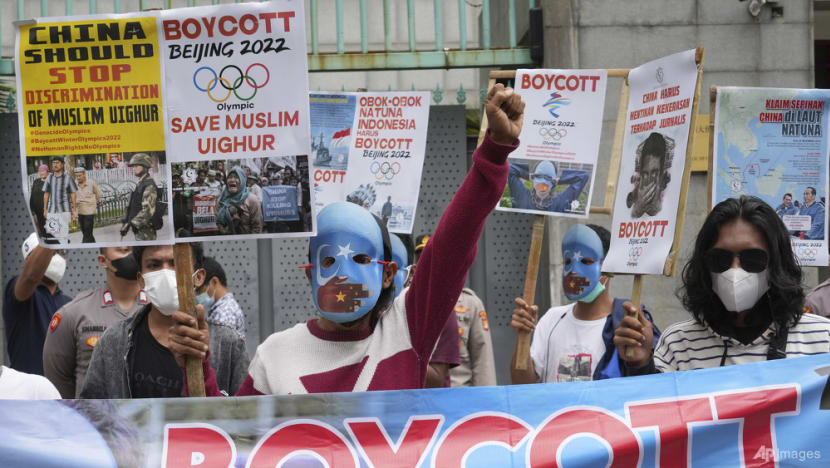Despite China's media influence in Southeast Asia, public remains sceptical: US-based think-tank
The Chinese government says that the report by Freedom House is “not fact-based” and “driven by ulterior motives”.

The Chinese flag flies near the China World Trade Center Tower 3 in Beijing on Nov 29, 2021. (Photo: GREG BAKER / AFP)
KUALA LUMPUR: Despite Beijing's media influence efforts in parts of Southeast Asia, the public has remained wary of Chinese state narratives, according to a report by US-based think-tank Freedom House.
The Beijing’s Global Media Influence 2022 report, which was released last week, examined 30 territories in terms of the intensity of China’s media influence efforts from early 2019 until the end of 2021.
Malaysia, Indonesia and the Philippines were among the 16 territories where there was high or very high intensity for such efforts.
The report noted that both Chinese ambassadors that served in Malaysia between 2019 and 2021 were active in publishing op-eds and participating in interviews, finding audiences in a wide range of popular outlets in Malay, Chinese and English.
It added that Chinese state narratives in Malaysia follow "the standard Chinese propaganda package", encompassing a mixture of rapport building, positive promotion of China and the Chinese Communist Party’s (CCP) governance model as well as "counternarratives to international criticism", particularly from the US.
"Chinese officials emphasised the continued 'friendship' between Malaysia and China and stressed that initiatives like the Belt and Road Initiative benefitted both countries," it added.
It highlighted that a topic commonly covered by Chinese state narratives in Malaysia were sovereignty disputes in the South China Sea.
"China’s territorial interests are couched in a rhetoric of 'maintaining peace and stability' implying that other foreign powers are seeking to dominate this space, and that Beijing is ensuring regional order and security," the report said.
China claims almost all of the energy-rich South China Sea, through which about US$3 trillion worth of ship-borne trade passes annually.
Malaysia, Brunei, the Philippines, Taiwan and Vietnam have overlapping claims.
Efforts to discredit evidence of mass detentions in Xinjiang and other atrocities by the Chinese government against Uyghurs are also common, according to the report.
For Indonesia, the Freedom House report noted that China's media influence efforts expanded between 2019 and 2021.
“Beijing has successfully pushed for new agreements with the country’s national news agency and a major free-to-air television network, opened new diplomatic social media accounts, and appealed to Indonesia's Muslim community through trips to Xinjiang that presented a government-controlled perspective of the region,” it said.
Related:
China has been accused by various bodies, including the UN Human Rights Office, of serious human right violations, including the detention of Uyghurs and other Muslims in the Xinjiang region. Beijing has denied these claims.
On the Philippines, Freedom House wrote: “There is a particular focus on the contentious South China Sea issue and on Manila’s relationship with the United States. One key narrative portrays China as a better ‘friend’ to the Philippines than the United States, particularly during the COVID-19 pandemic,” the report stated.
It noted how Chinese state media frequently cites Chinese vaccine donations to the Philippines while attacking US policies, suggesting for instance that the US is politicising investigations into COVID-19’s origins.
“The CCP calls for ‘win-win cooperation’ between China and the Philippines on the South China Sea dispute, emphasising that the countries’ common interests are far greater than their differences,” added Freedom House.
PUBLIC REMAINS WARY OF CHINESE STATE NARRATIVES
In Malaysia, where almost a quarter of the population is ethnic Chinese, the Freedom House report stated that the public was “wary of all forms of state-controlled news” and displayed “widespread scepticism to Chinese state narratives”.
“Many Malaysians attribute the success of their country’s COVID-19 recovery partly to assistance from China, but a majority worry about the Chinese government’s strategic and economic influence, particularly regarding its growing footprint in the South China Sea,” the report said.
“Recent polls of Malaysians consistently show increased wariness and scepticism of Chinese government motives in the region and internationally,” it added.
When it comes to Indonesia, the report maintained that trust in China remains low, continuing a trend that began in 2015.
Back then, China’s vice premier Liu Yandong, encouraged more exchanges between Chinese and Indonesian students. Her statement was misinterpreted in Indonesia as a signal of an impending mass migration from China to Indonesia.

The report claimed that the number of Indonesians who regard China as a “revisionist power” increased by 15 per cent from 2020 to 2021.
“Similar increases were found regarding perceptions of China as a strategic, political, and economic threat,” said Freedom House.
The report marked the intensity of Beijing’s influence media efforts as “high” for Malaysia, Indonesia and the Philippines. However, it pointed out that the Philippines was more resilient than the other two countries.
Freedom House highlighted that the Philippines has exerted “widespread pushback” on China’s actions in the South China Sea and its politicians have also expressed concerns about media influence from Beijing-back news outlets.
The Filipinos also tend to be “highly sceptical” towards China and the CCP, the report stated.
A music video released by the Chinese Embassy in Manila which promoted Chinese medical assistance and bilateral friendship amid the COVID-19 pandemic, also drew criticism from Filipinos on social media who saw it as blatant propaganda for Beijing’s stance on the territorial dispute, it added.
The report was compiled based on media investigations, interviews, scholarly publications, Chinese government sources, and on-the-ground research by local analysts, according to Freedom House.
Overall, the report stated that China was intensifying its campaign to influence and manipulate news and information worldwide and is determined to project a positive image of itself.
“The Chinese government, under the leadership of President Xi Jinping, is accelerating a massive campaign to influence media outlets and news consumers around the world. While some aspects of this effort use the tools of traditional public diplomacy, many others are covert, coercive and potentially corrupt,” the report said.
“A growing number of countries have demonstrated considerable resistance in recent years, but Beijing’s tactics are simultaneously becoming more sophisticated, more aggressive and harder to detect.”
REPORT DRIVEN BY ULTERIOR MOTIVES, SAYS BEIJING
Responding to a reporter’s question in Beijing, Chinese Foreign Ministry spokeswoman Mao Ning said the Freedom House report was “not fact-based” and “driven by ulterior motives”.
She added that Freedom House has a “long track record of making false allegations on China-related issues”, according to a transcript of the Sep 8 daily press briefing posted on the foreign ministry’s website.
“Telling the story of the Communist Party of China and presenting a true, multi-dimensional and panoramic view of China to the world is part and parcel of the job of Chinese media and foreign service,” she said.
“What we share with the world are facts, real numbers, concrete examples and plain truth. They are completely different from the so-called ‘influence efforts’ or ‘disinformation’ in the report,” the spokeswoman added.














